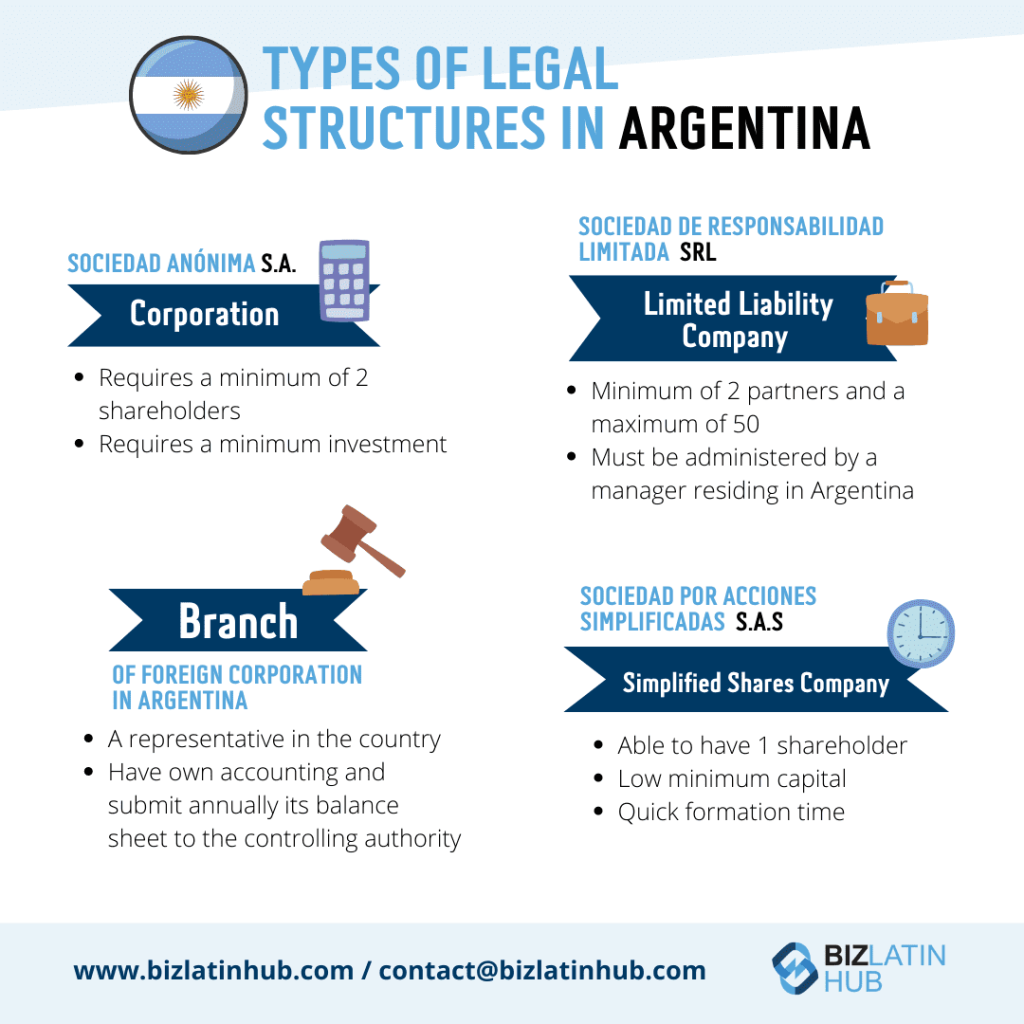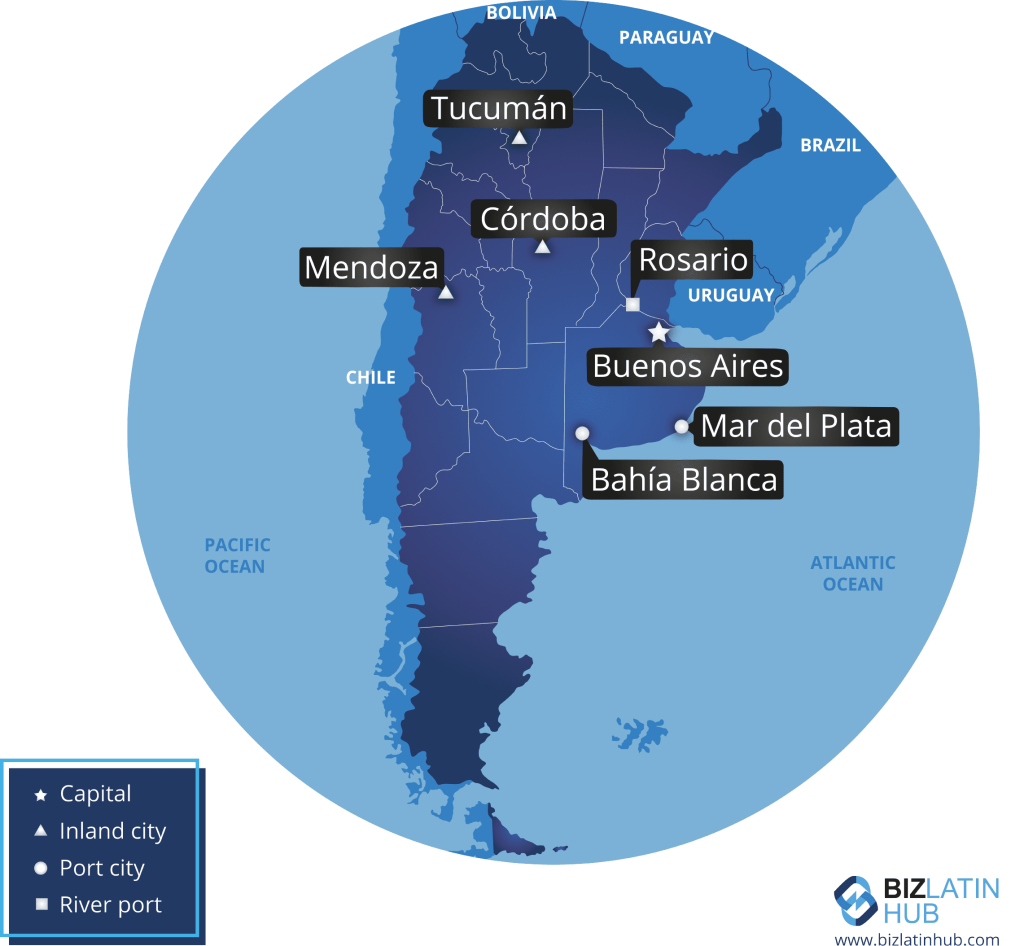Do you have a great business idea and would like to commence operations in Argentina? There are 4 types of legal structures in Argentina: in order to do so, you’ll have to legalize your business and choose the right legal structure according to the type of business activity you will be conducting. Argentina is full of business opportunities and is the third Latin American economy.
Argentina’s GDP is $632.77 billion and its GNI is $11,130 per capita. The economy is strong, in addition to the fact that there are already established legal structures in Argentina.
This article will provide you with the most commonly used types of legal entities in Argentina. Once these processes are complete, you are free to begin your business operations in this exciting, emerging economy with BizlatinHub.
Table of Contents
Why engage in Business in Argentina?
Argentina presents a multitude of reasons why it is a favorable destination for doing business, with its unique blend of opportunities and legal structures in Argentina that cater to diverse industries. Legal structures in Argentina provide a solid foundation for international investors, ensuring transparency and protection. These legal structures in Argentina, including joint ventures, subsidiaries, and branches, enable foreign businesses to establish a presence that suits their strategic goals.
Legal entities in Argentina, such as Sociedad Anónima (SA) and Sociedad de Responsabilidad Limitada (SRL), offer flexibility and liability protection, enhancing the appeal for entrepreneurs. These legal entities in Argentina facilitate efficient operations and compliance with local regulations. The government’s commitment to economic reforms further bolsters the business environment, attracting foreign direct investment.
Argentina’s skilled workforce, rich natural resources, and diverse industries create a robust market for goods and services. Legal structures in Argentina provide a framework for foreign entities to engage in partnerships with local companies, fostering innovation and collaboration.
The country’s strategic location and membership in the Mercosur trade bloc enhance its access to regional markets. Legal structures in Argentina also allow for easy repatriation of profits and capital. With a growing tech sector and emerging opportunities in renewable energy, foreign investors find Argentina’s business landscape promising.
In conclusion, Argentina’s favorable legal structures and legal entities create an environment ripe for international business ventures. The nation’s resources, workforce, and strategic advantages, coupled with its commitment to reforms, position it as an attractive destination for those seeking dynamic opportunities in Latin America.

This article will provide you with the most commonly used types of legal entities in Argentina
Corporation (Sociedad Anónima – ‘S.A’)
The first type of legal structure in Argentina is a corporation, which requires a minimum of (2) shareholders. It is not important whether they are local or foreign. A corporation requires a minimum investment of AR$100.000, with a proportion of the company shares of at least 10% – 90%. The Corporation must also have a board of directors of which the majority must reside in Argentina and hold annual shareholders’ meetings in order to assess the financial situation of the company.
Limited Liability Company (Sociedad de Responsabilidad Limitada – ‘SRL’)
An additional legal structure in Argentina is an SRL. An SRL can be formed with a minimum of (2) partners and a maximum of (50), The SRL requires a minimum capital commensurate with the activity to be performed by the company, which is to be divided into stocks. This structure must be administered by a manager residing in Argentina. Similar to a corporation, a SRL must also assess annual statements through a yearly partner’s meeting.
Simplified Shares Company (Sociedad por Acciones Simplificadas – ‘S.A.S’)

The Argentine S.A.S was created in 2017 in order to simplify the process of establishing a legal entity in Argentina. This type of legal structure has the following advantages:
- Able to have (1) shareholder (natural or legal person)
- Low minimum capital (twice the minimum wage)
- Quick formation time (the legal entity can be approved in 24 hours)
This new type of legal entity has been a key factor in the increased commercial interest in Argentina over the past year. Combined with investor-friendly reforms, Argentina is opening its doors to foreign participation, and the economy is feeling the benefits of this.
legal structures in Argentina – Branch of Foreign Corporation in Argentina
Installing a branch in Argentina is an attractive option for companies who have headquarters in a foreign country. In order to install the branch, proof of the existence of the office overseas must be provided to local authorities.
The branch will have to prove the following conditions:
- A representative in the country where the company is being established
- Carry out business in line with partnership purposes.
- Have own accounting and submit annually its balance sheet to the controlling authority
Learn more about the types of legal structures in Argentina
Argentina has recovered well from the debt crisis of 2001. This has been in part due to an increase in foreign investment which has helped to grow the economy. Choosing the right type of legal entity, and setting up a business in Argentina can be a challenge, for this reason, it is recommended to work with a local partner. Get in contact with Biz Latin Hub – our team of local experts and professionals can support you and your business venture in Argentina with our services ranging from legal and commercial representation to market entry. Feel free to contact us now for personalized information.
Watch the following video for more information on doing business in Latin America!
After reading about the Types of Legal Structures in Argentina, learn about how to do business in the region
The information provided here within should not be construed as formal guidance or advice. Please consult a professional for your specific situation. Information provided is for informative purposes only and may not capture all pertinent laws, standards, and best practices. The regulatory landscape is continually evolving; information mentioned may be outdated and/or could undergo changes. The interpretations presented are not official. Some sections are based on the interpretations or views of relevant authorities, but we cannot ensure that these perspectives will be supported in all professional settings.
